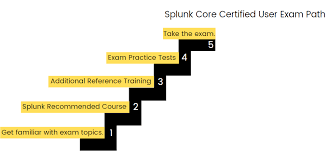The Splunk Core Certified Advanced Power User (SPLK-1004) certification validates a candidate’s advanced knowledge of using Splunk’s search, reporting, and dashboard functionalities. One of the most important topics on this exam is Correlating Events—a key area that reflects your ability to analyze and relate different data sources effectively. In this guide, we'll explore the core concepts, exam structure, practice exam questions, and preparation tips for Correlating Events, as well as relevant resources.

Understanding the Importance of Correlating Events in Splunk SPLK-1004 Exam
Correlating Events in Splunk is the process of linking events from multiple sources to derive insights that a single event cannot provide alone. It allows users to trace connections across varied data types, which is essential for deep-dive analysis in incident response, performance monitoring, and troubleshooting. Correlating Events is pivotal in fields like IT security, operations, and business intelligence, helping professionals make informed decisions based on consolidated insights.
Key Concepts in Splunk Correlating Events
Event Types and Data Models
Understanding event types in Splunk allows users to classify similar events for easier searching. Data models provide a structured framework for categorizing and mapping data, enabling more efficient event correlation.
Field Aliases and Calculated Fields
Field aliases and calculated fields let users define alternate names and create new field values, allowing more flexible and relevant data views. They’re essential for unifying data from different sources, which is critical in correlating events effectively.
Transaction Command
The transaction command groups events based on common field values, like IP addresses, over a specific time window. It’s indispensable for correlating events that represent different parts of a single transaction, such as login events, page visits, or API calls.
Search Language and Syntax
Mastering Splunk’s Search Processing Language (SPL) is crucial. The SPL syntax is flexible and powerful for creating searches that extract relevant data and create correlations between events. Examples include stats, eval, and lookup commands.
Splunk SPLK-1004 Exam Structure and Core Areas
The SPLK-1004 exam structure is designed to test a candidate’s command over advanced Splunk functionalities:
Number of Questions: Typically consists of around 65 multiple-choice and practical scenario questions.
Duration: Candidates are given 57 minutes to complete the exam.
Key Areas:
1.Advanced searching and reporting 2.Dashboards and visualizations 3.Correlating events (focus area) 4.Event types and field aliases
For detailed exam guidelines and requirements, refer to Splunk's official exam guide .
Tools and Resources for Correlating Events in Splunk SPLK-1004 Exam
Use of Splunk's Search & Reporting App
The Search & Reporting app is the main tool for creating and running searches, generating reports, and building dashboards. Practicing with this app is crucial for mastering event correlation.
Sample Data Sets
Utilize Splunk's sample data sets or import custom data to experiment with real-world scenarios, ensuring familiarity with transaction commands and field extraction.
Official Splunk Documentation and Courses
Splunk offers various resources:
Splunk Docs provides in-depth information on event correlation, SPL commands, and other exam topics.
Splunk Training and Certification courses are available on the Splunk Training Website to prepare for the SPLK-1004 exam.
Essential Terminology for Splunk SPLK-1004 Exam Correlating Events
Event Type: Classification of events based on shared characteristics.
Transaction: Grouping of related events for analysis.
Lookup: External data sources used to enrich event data.
Data Model: A structured dataset to facilitate data analysis and correlation.
Field Extraction: Splitting raw data into meaningful fields for analysis.
Familiarity with these terms is essential, as they form the foundation of most questions and tasks in the Splunk SPLK-1004 exam.
Practice Question for Splunk SPLK-1004 Exam Correlating Events Topic
Question: You have multiple login events and transaction events across several data sources. To create a transaction based on the session_id field with a maximum duration of 10 minutes, which SPL command should you use?
1.stats by session_id maxduration=10m
2.transaction session_id maxpause=10m
3.eventstats session_id maxduration=10m
4.lookup session_id maxpause=10m
Answer : 2. transaction session_id maxpause=10m.
Explanation: The transaction command is used to correlate events based on a common field—in this case, session_id. The maxpause=10m parameter limits the maximum time between events in a single transaction, making this the correct answer.
Top 3 FAQs for Splunk SPLK-1004 Exam Preparation
Q1: How much time should I dedicate to practicing Correlating Events in Splunk?
A: Focus on at least 15-20 hours practicing core SPL commands and transaction-based searches to master event correlation.
Q2: Are there official resources for the SPLK-1004 exam?
A: Yes, Splunk offers documentation and certification courses on its website, as well as the exam preparation guide, which is highly recommended.
Q3: How frequently is the Splunk SPLK-1004 exam content updated?
A: Splunk updates its certifications regularly, usually annually. It’s advised to check the latest study guide to stay updated.
Ready to Excel in Splunk SPLK-1004? Start Now!
Unlock your potential as a Splunk power user by diving into advanced functionalities like event correlation and mastering core SPL concepts. Sign up at Study4Exam for Splunk’s certification courses, or download the latest SPLK-1004 exam guide to ensure you’re fully prepared. Get hands-on with Splunk today to ensure success on exam day!
Posted Using InLeo Alpha
Hello.
We would appreciate it if you could avoid copying and pasting or cross-posting content from external sources (full or partial texts, video links, art, etc.).
Thank you.
If you believe this comment is in error, please contact us in #appeals in Discord.
this comment is an error .....
Hello.
Welcome to Hive.
To confirm your authorship of the content, could you please add the link to your Hive blog to your well-established social media account like Facebook, Instagram, or Twitter (which has not been recently created).
After you add the link, please respond to this comment with the URL link to that website.
You can remove this mention, once we confirm the authorship.
Thank you.
More Info: Introducing Identity/Content Verification Reporting & Lookup